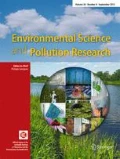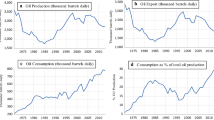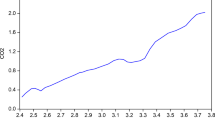Abstract
This article attempts to explore the nexus between oil consumption, economic growth and carbon dioxide (CO2) emissions in three East Asian oil importing countries (i.e. China, South Korea and Japan) over the period 1980–2013, by using the Granger causality, Johansen cointegration test, Generalised Impulse Response functions (GIRF) and variance decompositions. The empirical findings provide evidence for the existence of a long-run relationship between oil consumption and economic growth in China and Japan. The results also point to a uni-directional causality from running from oil consumption to economic growth in China and Japan, and from oil consumption to CO2 emissions in South Korea. The overall results of GIRF reveal that while economic growth in China and South Korea shows a positive response to oil consumption, this variable responses negatively to the same shock in Japan. In addition, oil consumption spikes cause a negative response of CO2 emissions in Japan and China, as well as a U-shape response in South Korea.







Similar content being viewed by others
References
Agung, I.G.N., 2009. Time Series Data Analysis Using Eviews. Wiley.
Alam MJ, Begum IA, Buysse J, Rahman S, Van Huylenbroeck G (2011) Dynamic modeling of causal relationship between energy consumption, CO2 emissions and economic growth in India. Renew Sust Energ Rev 15:3243–3251. doi:10.1016/j.rser.2011.04.029
Al-Iriani M a (2006) Energy-GDP relationship revisited: an example from GCC countries using panel causality. Energy Policy 34:3342–3350. doi:10.1016/j.enpol.2005.07.005
Al-mulali U (2011) Oil consumption, CO2 emission and economic growth in MENA countries. Energy. doi:10.1016/j.energy.2011.07.048
Al-mulali U, Binti Che Sab CN (2012) The impact of energy consumption and CO2 emission on the economic growth and financial development in the sub Saharan African countries. Energy 39:180–186. doi:10.1016/j.energy.2012.01.032
Al-mulali U, Weng-Wai L, Sheau-Ting L, Mohammed AH (2015) Investigating the environmental Kuznets curve hypothesis by utilizing the ecological footprint as an indicator of environmental degradation. Ecol Indic 48:315–323
Altinay G, Karagol E (2005) Structural break, unit root and causality between energy consumption and GDP in Turkey. Energy Econ 26:985–994
Ang JB (2007) CO2 emissions, energy consumption, and output in France. Energy Policy 35:4772–4778. doi:10.1016/j.enpol.2007.03.032
Ang JB (2008) Economic development, pollutant emissions and energy consumption in Malaysia. J. Policy Model 30:271–278
Apergis N, Ozturk I (2015) Testing environmental Kuznets curve hypothesis in Asian countries. Ecol Indic 52:16–22
Apergis N, Payne JE (2009) CO2 emissions, energy usage, and output in central America. Energy Policy 37:3282–3286. doi:10.1016/j.enpol.2009.03.048
Apergis N, Payne JE (2010a) The emissions, energy consumption and growth nexus: evidence from the commonwealth of independent states. Energy Policy 38:650–655
Apergis N, Payne JE (2010b) Energy consumption and growth in South America: evidence from a panel error correction model. Energy Econ 32:1421–1426
Aqeel A, Butt MS (2001) The relationship between energy consumption and economic growth in Pakistan. Asian Pacific Dev J 8:101–110
Arouri MEH, Ben Youssef A, M’henni H, Rault C (2012) Energy consumption, economic growth and CO2 emissions in Middle East and north African countries. Energy Policy 45:342–349. doi:10.1016/j.enpol.2012.02.042
Arvin MB, Pradhan RP, Norman NR (2015) Transportation intensity, urbanization, economic growth and CO2 emissions in the G-20 countries. Util Policy 35:50–66
Baek J (2015a) A panel cointegration analysis of CO 2 emissions, nuclear energy and income in major nuclear generating countries. Appl Energy 145:133–138
Baek J (2015b) Environmental Kuznets curve for CO2 emissions: the case of Arctic countries. Energy Econ 50:13–17
Baranzini A, Weber S, Bareit M, Mathys AN (2013) The causal relationship between energy use and economic growth in Switzerland. Energy Econ 36:464–470
Bartleet M, Gounder R (2010) Energy consumption and economic growth in New Zealand: results of trivariate and multivariate models. Energy Policy 38:3505–3517
Behmiri NB, Manso JRP (2012) Crude oil conservation policy hypothesis in OECD (organisation for economic cooperation and development) countries: a multivariate panel granger causality test. Energy 43:253–260
Behmiri NB, Manso JRP (2013) How crude oil consumption impacts on economic growth of sub-Saharan Africa? Energy 54:74–83
Belke A, Dobnik F, Dreger C (2011) Energy consumption and economic growth: new insights into the cointegration relationship. Energy Econ 33:782–789
Belloumi M (2009) Energy consumption and GDP in Tunisia: cointegration and causality analysis. Energy Policy 37:2745–2753
Bhattacheraya M, Bhattacharya S (2015) The role of technology on the dynamics of coal consumption–economic growth: new evidence from China. Appl Energy 154:686–695
Bildirici M, Bakirtas T (2014) The relationship among oil, natural gas and coal consumption and economic growth in BRICTS countries. Energy 65:134–144
Bildirici M, Kayikci F (2013) Effects of oil production on economic growth in Eurasian countries: panel ARDL approach. Energy 49:156–161
Bloch H, Rafiq S, Salim R (2012) Coal consumption, CO2 emission and economic growth in China: empirical evidence and policy responses. Energy Econ 34:518–528
Chandran Govindaraju VGR, Tang CF (2013) The dynamic links between CO2 emissions, economic growth and coal consumption in China and India. Appl Energy 104:310–318. doi:10.1016/j.apenergy.2012.10.042
Chang CC (2010) A multivariate causality test of carbon dioxide emissions, energy consumption and economic growth in China. Appl Energy 87:3533–3537. doi:10.1016/j.apenergy.2010.05.004
Chontanawat J, Hunt L, Pierse R (2008) Does energy consumption cause economic growth? Evidence from a systematic study of over 100 countries. J Policy Model 30:209–220
Chu HP (2012) Oil consumption and output: what causes what? Bootstrap panel causality for 49 countries. Energy Policy 51:907–915
Chu H, Chang T (2012) Nuclear energy consumption, oil consumption and economic growth in G-6 countries: bootstrap panel causality test. Energy Policy 48:762–769
Dickey DA, Fuller WA (1979) Distribution of the estimators for autoregressive time series with a unit root. J Am Stat Assoc 74:427–431
Dickey DA, Fuller WA (1981) Likelihood ratio statistics for autoregressive time series with a unit root. Econometrica 49:1057–1072
Fatai K, Oxley L, Scrimgeour FG (2004) Modelling the causal relationship between energy consumption and GDP in New Zealand, Australia, India, Indonesia, The Philippines and Thailand. Math Comput Simul 64(3):431–445
Fosten J, Morley B, Taylor T (2012) Dynamic misspecification in the environmental Kuznets curve: evidence from CO2 and SO2 emissions in the United Kingdom. Ecol Econ 76:25–33
Fuinhas JA, Marques AC, Quaresma TN (2015) Does oil consumption promote economic growth in oil producers? Evidence from OPEC countries. Int J Energy Sect Manag 9:323–335
Galeotti M, Lanza A, Pauli F (2006) Reassessing the environmental Kuznets curve for CO2 emissions: a robustness exercise. Ecol Econ 57:152–163
Gangadharen L, Valenzuela MR (2001) Interrelationships between income, health, and the environment: extending the environmental Kuznets curve hypothesis. Ecol Econ 36:513–531
Granger C (1969) Investigating causal relations by econometric models and crossspectral methods. Econometrica 37:424–438
Granger C (1998) Some recent development in a concept of causality. J. Econom. 39:199–211
Halicioglu F (2009) An econometric study of CO2 emissions, energy consumption, income and foreign trade in Turkey. Energy Policy 37:1156–1164
Heidari H, Katircioglu ST, Saeidpour L (2015a) Economic growth, CO 2 emissions, and energy consumption in the five ASEAN countries. Int J Electr Power Energy Syst 64:785–791
Holz CA (2008) China’s economic growth 1978-2025: what we know today about China’s economic growth Tommorrow. World Dev 36:1665–1691
Hu J-L, Lin C-H (2008) Disaggregated energy consumption and GDP in Taiwan: A threshold co-integration analysis. Energy Econ 30(5):2342–2358
Huang BN, Hwang MJ, Yang CW (2008) Causal relationship between energy consumption and GDP growth revisited: a dynamic panel data approach. Ecol Econ 67:41–54
International Energy Statistics, 2015. . U.S. Energy Inf. Adm. URL http://www.eia.gov/cfapps/ipdbproject/iedindex3.cfm?tid=5&pid=53&aid=1 Accessed 7.17.15
Jalil A, Mahmud SF (2009) Environment Kuznets curve for CO2 emissions: a cointegration analysis for China. Energy Policy 37:5167–5172
Jinke L, Li Z (2011) A causality analysis of coal consumption and economic growth for China and India. Nat Resour 2:54–60
Jin-ke, Feng-hua W, Hua-ling S (2009) Differences in coal consumption patterns and economic growth between developed and developing countries. Procedia Earth and Planetary Science 1(1):1744–1750
Jung S, Kang S (2013) Dynamic analysis between environmental quality, energy consumption and income. Environ Policy Res (Korea Environ Institute) 12:97–122
Kasman A, Duman YS (2015) CO2 emissions, economic growth, energy consumption, trade and urbanization in new EU member and candidate countries: a panel data analysis. Econ Model 44:97–103
Katz D (2015) Water use and economic growth: reconsidering the environmental Kuznets curve relationship. J Clean Prod 88:205–213
Kesikoglu F, Yidirim E (2014) The causal effect of shifting oil to natural gas consumption on current account balance and economic growth in 11 OECD countries: evidence from bootstrap-corrected panel causality test. Procedia- Soc Behav Sci 143:1064–1069
Kim S, Lee K (2008) On the non-linear relationship between CO2 emissions and economic growth : the empirical evidence with the STAR model. Environ Resour Econ Rev (Korean journal) 17:3–22
Koop G, Pesaran M, Potter S (1996) Impulse response analysis in non-linear multivariate models. J Econom 74:119–147
Kum H, Ocal O, Aslan A (2012) The relationship among natural gas energy consumption, capital and economic growth: bootstrap-corrected causality tests from G-7 countries. Renew Sust Energ Rev 16:2361–2365
Lean HH, Smyth R (2010) CO2 emissions, electricity consumption and output in ASEAN. Appl Energy 87:1858–1864
Lee CC (2005) Energy consumption and GDP in developing countries: a cointegrated panel analysis. Energy Econ 27:415–427
Li R, Leung G (2012) Coal consumption and economic growth in China. Energy Policy 40:438–443
Long X, Naminse EY, Du J, Zhuang J (2015) Nonrenewable energy, renewable energy, carbon dioxide emissions and economic growth in China from 1952 to 2012. Renew Sust Energ Rev 52:680–688. doi:10.1016/j.rser.2015.07.176
Lutkepohl H (1991) Introduction to multiple time series analysis. Seringer-Verlag, Berlin
Lutkepohl H, Reimers HE (1992) Impulse response analysis of cointegrated systems. J Econ Dyn Control 16:53–78
Masih A, Masih R (1996) Energy consumption, real income and temporal causality: results from a multi-country study based on cointegration and error correction modelling techniques. Energy Econ 18:165–183
Masoudi N, Santugini M, Zaccour G (2016) A dynamic game of emissions pollution with uncertainly and learning. Environ Resour Econ 64:349–372
Mo S, Kim S (2003) Dynamic causal relationships between energy consumption and economic growth. Environ Resour Econ Rev 12:327–346
Mohammadi H, Parvaresh S (2014) Energy consumption and output: evidence from a panel of 14 oil-exporting countries. Energy Econ 41:41–46
Odhiambo N (2009) Energy consumption and economic growth nexus in Tanzania: an ARDL bounds testing approach. Energy Policy 37:617–622
Omri A (2013) CO2 emissions, energy consumption and economic growth nexus in MENA countries: evidence from simultaneous equations models. Energy Econ 40:657–664. doi:10.1016/j.eneco.2013.09.003
Osorio, C., Unsal, D.F., 2011. Inflation Dynamics in Asia: Causes, Changes and Spillovers from China.
Ozturk I, Acaravci A (2010) CO 2 emissions, energy consumption and economic growth in Turkey. Renew Sust Energ Rev 14:3220–3225
Ozturk I, Aslan A, Kalyoncu H (2010) Energy consumption and economic growth relationship: evidence from panel data for low and middle income countries. Energy Policy 38:4422–4428. doi:10.1016/j.enpol.2010.03.071
Park K, Kim J (2013) Sectoral energy consumption and economic growth in Korea. Korea Energy Econ Rev 12:59–83
Park SY, Yoo SH (2014) The dynamics of oil consumption and economic growth in Malaysia. Energy Policy 66:218–223
Pesaran M, Shin Y (1998) Generalized impulse response analysis in linear multivariate models. Econ Lett 58:17–29
Phillips PCB, Perron P (1988) Testing for a unit root in time series regression. Biometrica 75:335–346
Qin D, Cagas MA, Ducanes G, He X, Liu R, Liu S (2009) Effects of income inequality on China’s economic growth. J Policy Model 31:69–86
Robalino-López A, Mena-Nieto A, Garcia-Ramos JE (2015) Studying the relationship between economic growth, CO2emissions, and the environmental Kuznets curve in Venezuela (1980–2025). Renew Sust Energ Rev 41:602–614
Saboori B, Sulaiman J (2013a) CO2 emissions, energy consumption and economic growth in Association of Southeast Asian Nations (ASEAN) countries: a cointegration approach. Energy 55:813–822
Saidi K, Hammami S (2015) The impact of CO 2 emissions and economic growth on energy consumption in 58 countries. Energy Reports 1:62–70. doi:10.1016/j.egyr.2015.01.003
Sims CA (1980) Macroeconomic and reality. Econometrica 48:1–48
Solarin S, Shahbaz M (2015) Natural gas consumption and economic growth: the role of foreign direct investment, capital formation and trade openness in Malaysia. Renew Sust Energ Rev 42:835–845
Song T, Zheng T, Tong L (2008) An empirical test of the environmental Kuznets curve in China: a panel cointegration approach. China Econ Rev 19:381–392
Soytas U, Sari R (2003) Energy consumption and GDP: causality relationship in G-7 and emerging markets. Energy Econ 25:33–37
Soytas U, Sari R, Ewing BT (2007) Energy consumption, income, and carbon emissions in the United States. Ecol Econ 62:482–489
Stern DI (1993) Energy and economic growth in the USA: a multivariate approach. Energy Econ 15:137–150
Stern DI (2004) The rise and fall of the environmental Kuznets curve. World Dev 32:1419–1439
Stern DI, Common M, Barbier E (1996) Economic growth and environmental degradation: a critique of the environmental Kuznets curve. World Dev 24:1151–1160
Taher, N., Al-Hajjar, B., 2014. Energy and Environment in Saudi Arabia: Concerns & Opportunities. Springer Publication
Tiwari AK (2011) Energy consumption, CO2 emissions and economic growth: a revisit of the evidence from India. Appl Econom Int Dev 11:165–189
United Nations (2015) The millennium development goals report. United nations, New York
Vivoda V (2012) Japan’s energy security predicament post-Fukushima. Energy Policy 46:135–143
Wang SS, Zhou DQ, Zhou P, Wang QW (2011) CO2 emissions, energy consumption and economic growth in China: a panel data analysis. k 39:4870–4875. doi:10.1016/j.enpol.2011.06.032
Wolde-Rufael Y (2005) Energy demand and economic growth: the African experience. J Policy Model 27:891–903
Wolde-Rufael Y (2010) Coal consumption and economic growth revisited. Appl Energy 87:160–167
World bank, 2015. World Development Indicators [WWW Document]. World Bank. URL http://data.worldbank.org (Accessed 7.17.15).
Xiumei S, Min Z, Ming Z (2011) Empirical study on the relationships between economic growth and carbon emissions in resource dependent cities based on VAR. Energy Procedia 5:2461–2467
Yang HY (2000a) Coal consumption and economic growth in Taiwan. Energy Sources 22:109–115
Yang HY (2000b) A note on the causal relationship between energy and GDP in Taiwan. Energy Econ 22:309–317
Yoo SH (2006) Oil consumption and economic growth: evidence from Korea. Energy sources, part B econ. Plan. Policy 1:235–243
You J (2011) China’s energy consumption and sustainable development: comparative evidence from GDP and genuine saving. Renew Sust Energ Rev 15:2984–2989
Yousefi-Sahzabi A, Sasaki K, Yousefi H, Sugai Y (2011) CO2 emission and economic growth of Iran. Mitig Adapt Strateg Glob Chang 16:63–82
Yuan JH, Kang JG, Zhao CH, Hu ZG (2008) Energy consumption and economic growth: evidence from China at both aggregated and disaggregated levels. Energy Econ 30:3077–3094
Zhang X-P, Cheng X-M (2009) Energy consumption, carbon emissions, and economic growth in China. Ecol Econ 68:2706–2712. doi:10.1016/j.ecolecon.2009.05.011
Zhixin Z, Xin R (2011) Causal relationships between energy consumption and economic growth. Energy Procedia 5:2065–2071
Zou G, Chau KW (2006) Short and long run effects between oil consumption and economic growth in China. Energy Policy 34:3644–3655
Author information
Authors and Affiliations
Corresponding author
Additional information
Responsible editor: Philippe Garrigues
Rights and permissions
About this article
Cite this article
Saboori, B., Rasoulinezhad, E. & Sung, J. The nexus of oil consumption, CO2 emissions and economic growth in China, Japan and South Korea. Environ Sci Pollut Res 24, 7436–7455 (2017). https://doi.org/10.1007/s11356-017-8428-4
Received:
Accepted:
Published:
Issue Date:
DOI: https://doi.org/10.1007/s11356-017-8428-4




